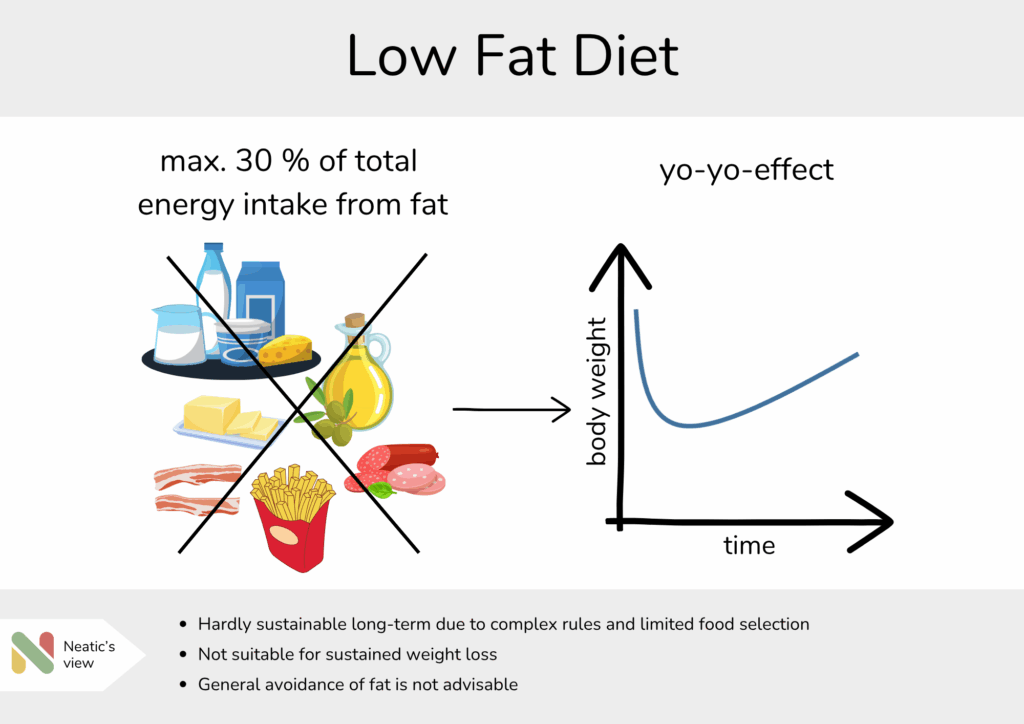
Major points:
- Low fat diets limit either all fats to less than 30% or saturated fats to less than 10% of total energy intake.
- A short-term weight loss can be achieved by low fat diets, but it cannot be maintained over the long term.
- Neatic advises against a general fat reduction since the cost-benefit ratio is unfavorable.
What are low fat diets?
In low fat diets, less than 30% of the total energy should be eaten in the form of fat. However, some low fat diets do not take the total fat intake into account, but only the so-called saturated fats. These are considered particularly harmful and are found, for example, in meat, sausages, and dairy products. Saturated fats are typically limited to less than 10% of total energy intake in a low fat diet.
For healthy adolescents and adults, the German Nutrition Society (DGE) recommends that a maximum of 30% of total energy should be supplied by fat. However, data from the National Nutrition Survey 2 show that women eat on average 35% and men 36% of total energy in the form of fat.
What happens on a low fat diet?
One gram of fat provides nine kilocalories of energy to the body. This is more than double compared to the same amount of carbohydrates and proteins, which provide four kilocalories per gram. Therefore, it is theoretically easier to save energy by reducing fat intake, which in turn should make weight loss easier.
In addition to a reduction in body weight, a low-fat diet aims to improve blood lipid levels. In particular, a reduction of the “bad” LDL cholesterol and an increase of the “beneficial” HDL cholesterol are linked to a reduced risk for cardiovascular diseases such as heart attack and stroke.

What does science say?
Low fat diets promise to lose weight easily and quickly. Studies show that with low fat diets weight is lost in the short term, but these effects are not maintained in the long term. In a direct comparison, low fat diets tend to perform worse than low carb diets.
A particularly well-done study on low fat diets was published in 2008 (Shai et al., 2008). In the so-called Dietary Intervention Randomized Controlled Trial (DIRECT), three groups with around 100 participants each were created: low carb diet, low fat diet, and Mediterranean diet. At the workplace, meals were prepared and labeled according to group classification. This ensured that meals during working hours were definitely of the respective diet form. In addition, family members were trained. In the first six months, weight loss in the low fat group was comparable to the Mediterranean diet, with a weight loss of just under 5 kg, but worse than in the low carb diet group.
After six months, the weight slowly increased again. After two years, in the comparison of the three diets, weight loss in the low fat group was the lowest, averaging just under 3 kg (Shai et al., 2008). This trend continued over the next four years, and weight loss was lowest after six years, averaging about 0.5 kg (Schwarzfuchs et al., 2012). The positive effects on blood lipids were also less pronounced for the low fat diet compared to the other two diets (Shai et al., 2008, Schwarzfuchs et al., 2012).
In another study conducted over two years, the low fat diet performed similar to a low carb diet (Foster et al., 2010). Again, weight loss was most pronounced in the first six months at nearly 12 kg. After that, participants slowly regained weight and after 2 years weight loss was around 7 kg. A slight improvement in blood lipid levels was visible with both diets after 2 years of intervention (Foster et al., 2010).
As with all diet studies, a major problem is that many study participants do not follow through to the end. Fortunately, in the study by Shai et al. (2008), only 10 of 104 participants in the low fat group dropped out of the study. In Foster et al. (2010), the number was significantly higher, here 49 out of 154 participants in the low fat group left the study within two years. It cannot be ruled out that these participants were dissatisfied with their weight loss progress.

What does Neatic recommend concerning low fat diets?
Neatic does not restrict the consumption of fat. Fat reduction is time-consuming, difficult to maintain, and does not achieve effective long-term weight loss. Also, the link between fat intake, blood lipids, and cardiovascular disease is weak, if it exists at all. Thus, low fat diets have an unfavorable cost-benefit ratio. Last but not least: Fat is an important flavor carrier and satiety factor that has been part of our diet for thousands of years.
The Neatic principles, on the other hand, focus on three ingredients that have only entered our diet in large quantities in the last 100 years: Flavors, sweeteners, and sugar.
Neatic does not recommend a general reduction in fat!

Bibliography:
Deutsche Gesellschaft für Ernährung e.V. (2000): Referenzwert Fett. Available online at https://www.dge.de/wissenschaft/referenzwerte/fett/, checked on 2/9/2022.
Foster, Gary D.; Wyatt, Holly R.; Hill, James O.; Makris, Angela P.; Rosenbaum, Diane L.; Brill, Carrie; Stein, Richard I.; Mohammed, B. Selma; Miller, Bernard; Rader, Daniel J.; Zemel, Babette; Wadden, Thomas A.; Tenhave, Thomas; Newcomb, Craig W.; Klein, Samuel (2010): Weight and Metabolic Outcomes After 2 Years on a Low-Carbohydrate Versus Low-Fat Diet: A Randomized Trial. Ann Inter Med 153 (3), pp. 147–157. DOI: 10.7326/0003-4819-153-3-201008030-00005.
Max Rubner-Institut (2008): Nationale Verzehrsstudie II. Ergebnisbericht, Teil 2. Die bundesweite Befragung zur Ernährung von Jugendlichen und Erwachsenen. Available online at https://www.bmel.de/SharedDocs/Downloads/DE/_Ernaehrung/NVS_ErgebnisberichtTeil2.pdf;jsessionid=9D48DD3B81AA52123DD134242DF6DC3A.live922?__blob=publicationFile&v=2, checked on 6/01/2021
Schwarzfuchs, Dan; Golan, Rachel; Shai, Iris (2012): Four-year follow-up after two-year dietary interventions. N Engl J Med 367 (14), pp. 1373–1374. DOI: 10.1056/NEJMc1204792.
Shai, Iris; Schwarzfuchs, Dan; Henkin, Yaakov; Shahar, Danit R.; Witkow, Shula; Greenberg, Ilana; Golan, Rachel; Fraser, Drora; Bolotin, Arkady; Vardi, Hilel; Tangi-Rozental, Osnat; Zuk-Ramot, Rachel; Sarusi, Benjamin; Brickner, Dov; Schwartz, Ziva; Sheiner, Einat; Marko, Rachel; Katorza, Esther; Thiery, Joachim; Fiedler, Georg Martin; Blüher, Matthias; Stumvoll, Michael; Stampfer, Meir J. (2008): Weight loss with a low-carbohydrate, Mediterranean, or low-fat diet. N Engl J Med 359 (3), pp. 229–241. DOI: 10.1056/NEJMoa0708681.
